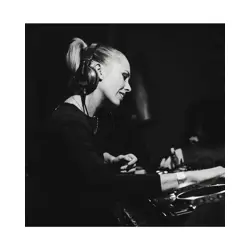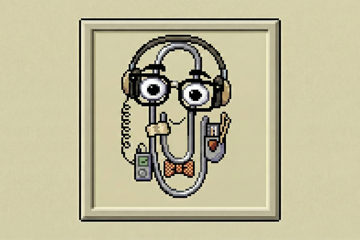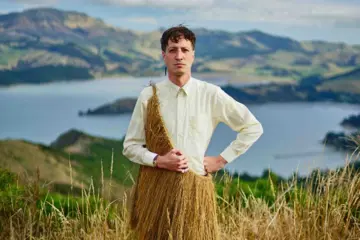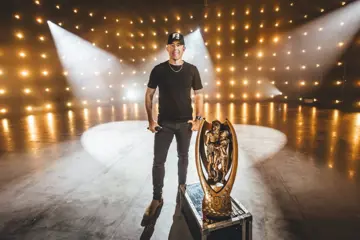 Sarah Main
Sarah MainSarah Main emerged as Australia's first female superstar DJ/producer, leaving Sydney for Ibiza, where she landed a longstanding residency at the mythic nightclub Pacha. Today the house music futurist is expanding her repertoire into visual art as well as embracing cutting-edge digital technologies – including NFTs (non-fungible tokens). "I like to keep up with the latest things – I just find it exciting," she enthuses. "I find it invigorating to my creative processes… That keeps me interested in life and sane. I think it's just who I am as a person."
Main is sparky in the morning as she faces three hours of Zoom meetings. "I'm not one to have so many late nights now," she laughs. The multidisciplinary artist is returning to her original hometown as a special guest at Vivid Sydney's "epic" Future Art party, celebrating the digital art movement. She has previously bonded with the FA crew, but Darling Harbour's Home club is also an old DJ haunt.
Main's career has been less about serial reinvention than evolution. In fact, she initially pursued visual art intently in adolescence – painting to transform trauma. "The best things in my life have been borne out of tragedy or some bad experience," Main reveals. "We had a little bit of a tragedy in the family – but I won't say what it was." She attended school the next day but "ended up having an altercation with a teacher and getting in trouble – and then the tears started coming, and I was so embarrassed." Main fled to the art room, "throwing paint on the canvas." And she didn't stop, "to the point where I didn't have to go to class anymore."
Main subsequently studied Fine Arts at Sydney University. But, around the same time, she began clubbing and discovered a new passion – house. She was soon obsessed with DJing, sitting in a room and honing her skills. Main dropped out of uni after six months, as she secured her earliest gigs in a vital underground. "It was that era of possibility; that anything's achievable."
Don't miss a beat with our FREE daily newsletter
A defiant Main established herself in the '90s' male-dominated scene, overcoming the "stigma" of being a female DJ to win over Frankie Knuckles. "Everyone's like, 'You're mad – how are you gonna get a gig, you're a girl?'," she chuckles.
In 2001 Main moved to Ibiza. Tina Turner once explained that she abandoned the US for Europe because it's where audiences were most appreciative. But that wasn't necessarily a factor for Main. "I actually miss Australia sometimes because I had a really nice thing going on in Australia," she counters. "I had all my friends, and we were like a little group, and I taught some of them to DJ. We had some amazing times. So it wasn't about appreciation of my craft or the response I was getting from the people."
Rather, Main left because of her "personality". "I'm super-curious, and I get bored really easily," she laughs. The Balearic Isle tantalised her with fresh challenges. "Professionally, I'd sort of covered all bases in Australia. I'd got to that point where I was like, 'Well, what's next?' And, when I get to Ibiza, and then I walked into Pacha, I'm like, 'Ah, this is next!'"
Impressively, Main scored a main room spot at Pacha – Ibiza's inaugural superclub, launching in 1973 – and she'd serve as a glamorous global ambassador. "That just opened up a whole new world of touring and seeing new places and hearing new DJs constantly." Main mixed several mix CDs under the Pacha banner, hosted syndicated radio shows, and even cameoed in the 2000s cult club mockumentary, It's All Gone Pete Tong.
However, Main grew restless in her Mediterranean idyl. "I got bored." The DJ "never got bored of playing in Pacha as such," she stresses, latterly joining its El Baile party. "I think I got bored of the lifestyle, which was one of the things that did attract me in the beginning – it was that chaotic craziness and like colourful people and experiences. But that all got a bit bland as well in the end. I guess it didn't seem so purposeful – like it sort of lacked a little bit of meaning. It's fun to be all hedonistic for a while. But [then] you're like, 'Well, okay, what am I actually adding to the world here?'"
Another frustration? Main didn't feel punters "connected" to her as a stalwart. "People would come to see me DJ but not even know what style of music I play," she admits. "Then they'd say, 'Can you play more like David Guetta?' And I'm like, 'But this is not me being creative. This is something totally different.' So I lost my passion a little bit."
In 2019 Main hurled herself back into art, recalling one day in Barcelona when she spontaneously commenced line drawings. Main resumed painting – and, having hit on a bold graphic style, held an exhibition. "That was the starting point that took me on these weird and wonderful journeys that I've been on for the last four years with all this crazy stuff that consumes my life and is why I don't actually leave the house anymore!" She'd combine painting with augmented reality, exploring ways to integrate her art and music in both the real world and metaverse.
Main developed an interest in cryptocurrency through a friend in lockdown. The Australian swotted up on trading and fell into a welcoming and transparent community – something she hasn't always encountered in the music industry. "People like to lift each other up; people like to help each other." Main successfully utilised NFTs, then for her visual art. She's now a proponent of Web3 – a decentralised and democratic incarnation of the Internet.
Aphex Twin, Richie Hawtin and Grimes are among those electronic acts who've issued widely-publicised NFTs. But Main acknowledges that the format is still contentious in the scene – the NFT is regarded with suspicion as a novelty, speculative or, worse, a grift. "I do see that there is distrust – and that's just come from the propaganda in the media, like always, you know, and people not understanding it." (In 2021, DJ Mag attempted to demystify the subculture with its piece, "What are NFTs and why should electronic music care?")
Main suggests that the terminology is off-putting – few realising that NFT is simply a file type. "There's so many things, and exciting things, that are gonna come out of this in the future. It'll just happen, and people will just start using the technology, but they won't know it's driven by an NFT."
Main values the NFT's disruptive potential. "I liked the idea of the ownership – it's proven ownership," she says. "If you own it, it's there on the blockchain – no one can ever change that… The ownership was the first thing, then the idea that you could get paid for your work in perpetuity."
The NFT provides musicians with an alternative to streaming platforms – which have devalued roll-outs for all but the biggest pop stars. "The whole system has degraded – and I've watched that degradation over the years. [But] I believe that this technology and the way it functions and the way you function within the system has the ability to help artists create a self-sustaining future financially."
In February, Main launched the single Keep Tryin' as a hybrid release with a utility NFT on TokenTraxx, pricing it as she would a limited-edition vinyl. Though "not life-changing", the DJ accrued $1200 – significantly more than she'd have purely via streaming. Main aims to have a sequel in July. She has also collaborated on a song with Karla, a virtual singer produced by the Casperaki artificial intelligence platform, the lyrics courtesy of ChatGBT. "I'm in an experimental stage right now with it all."
Meanwhile, Main has introduced yet another intriguing vehicle, Data Vaeda, alongside Berlin-based producer Jonathan Walter, describing it as "immersive storytelling" with cinematic electronica, AI animation and sci-fi concepts. "I think that this space offers that chance for people to be more authentic again and return to their artistry and create special things that people wanna collect – because it's about digital collectibles. Everyone loves collecting stuff, right? I used to collect spoons – and I love my spoon collection!" Plus, she's the director of DCentralize, a decentralised festival.
Main will express the myriad facets of her work at Future Art. "It's truly incredible to be back in Australia for such an extraordinary event that brings together all my creative endeavours in one place," the friendly traveller says in a follow-up email. "I'm thrilled to have the opportunity to showcase my paintings with AR, present my digital animations, share my immersive storytelling project, Data Vaeda, and top it off with a DJ set featuring my disco-tinged house sound that was born right here in Sydney. It has been quite some time since I last performed in Australia, making this experience exceptionally exciting for me."
You can purchase tickets to Future Art (June 16th) here.
















